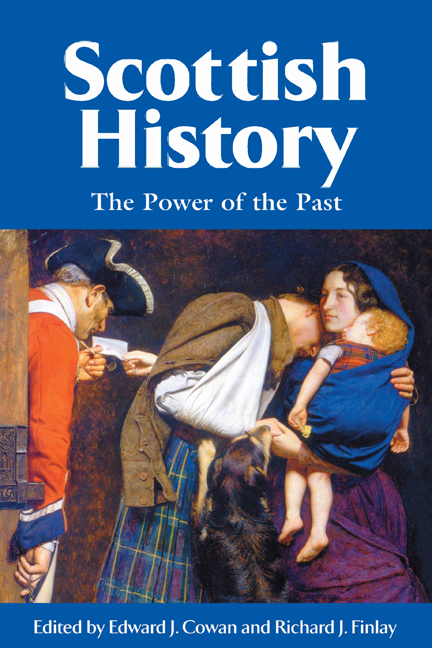Book contents
- Frontmatter
- Contents
- Contributors
- Introduction
- 1 The Picts‘ Place in the Kingship's Past Before John of Fordun
- 2 The Demonisation of King John
- 3 Late Medieval Scotland and the Matter of Britain
- 4 In Search of the Scottish Reformation
- 5 Civil Society and the Celts: Hector Boece, George Buchanan and the Ancient Scottish Past
- 6 The Covenanting Tradition in Scottish History
- 7 ‘What's in a Name?’: Pedigree and Propaganda in Seventeenth-Century Scotland
- 8 The Ideological Uses of the Picts, 1707-c.1990
- 9 The Jacobite Cult
- 10 Queen Victoria and the Cult of Scottish Monarchy
- 11 ‘Their Laurels Wither'd, and their Name Forgot’: Women and the Scottish Radical Tradition
- 12 Tomorrow's Ancestors: Nationalism, Identity and History
- Index
9 - The Jacobite Cult
Published online by Cambridge University Press: 24 September 2020
- Frontmatter
- Contents
- Contributors
- Introduction
- 1 The Picts‘ Place in the Kingship's Past Before John of Fordun
- 2 The Demonisation of King John
- 3 Late Medieval Scotland and the Matter of Britain
- 4 In Search of the Scottish Reformation
- 5 Civil Society and the Celts: Hector Boece, George Buchanan and the Ancient Scottish Past
- 6 The Covenanting Tradition in Scottish History
- 7 ‘What's in a Name?’: Pedigree and Propaganda in Seventeenth-Century Scotland
- 8 The Ideological Uses of the Picts, 1707-c.1990
- 9 The Jacobite Cult
- 10 Queen Victoria and the Cult of Scottish Monarchy
- 11 ‘Their Laurels Wither'd, and their Name Forgot’: Women and the Scottish Radical Tradition
- 12 Tomorrow's Ancestors: Nationalism, Identity and History
- Index
Summary
The ‘Tartan Curtain’, ‘Balmoralisation’, ‘Scotch Myths’ and so on are all terms which have been used to emphasise the scope and profundity of the influence of the tartan cult after 1800, or more precisely 1822, the occasion of George IV's visit to Scotland. They are also words which have been used as a currency of scorn, indicative of the perceived factitiousness of the process they are describing. It is said that presenting Scotland as essentially ‘Highland’ is a nineteenth-century fabrication; that such fabrication trivialised Scottish history, and, by trivialising it, marginalised it. To reclaim the underlying historicity of Scotland, it is thus necessary to exorcize the influence of the villains who invented this particular system of cultural representation, shortbread-tin Scotland. The usual suspects are Stewart of Garth, the Sobieski Stuarts and, of course, Sir Walter Scott.
This tartan cult stressed particular aspects of Scottish experience: royalism, Highland dress, militarism, hardihood, physical strength and virility. It had little to say of the covenants, mercantilism, industrialisation, the ideas of the Scottish Enlightenment or the culture of urban Scotland. Politically, it was closely linked to the Jacobite century (1688— 1788), and sought (particularly in the version essayed by Sir Walter Scott) to finally rehabilitate the losing side, on condition that its apparatus of representation would in future always be displayed severed from any political content. Scottish (misplaced) loyalty to the Stuarts would be the symbolic avatar of their (appropriate) loyalty to the Georges; the Wrong but Wromantic exploits of the Jacobites would become the right-thinking heroics of Scottish troops in the Napoleonic Wars. Instead of being ashamed of the Jacobite century, it could be acknowledged in terms of a continuing tradition of loyalty and valour, now happily transferred to a better cause. It is this historical turn to which Scott returned again and again in his fiction: in The Antiquary, for example, the Catholic earl of Glencairn comes out of his reclusive broodings on the past to lead the militia against the French.
- Type
- Chapter
- Information
- Scottish HistoryThe Power of the Past, pp. 191 - 208Publisher: Edinburgh University PressPrint publication year: 2020



